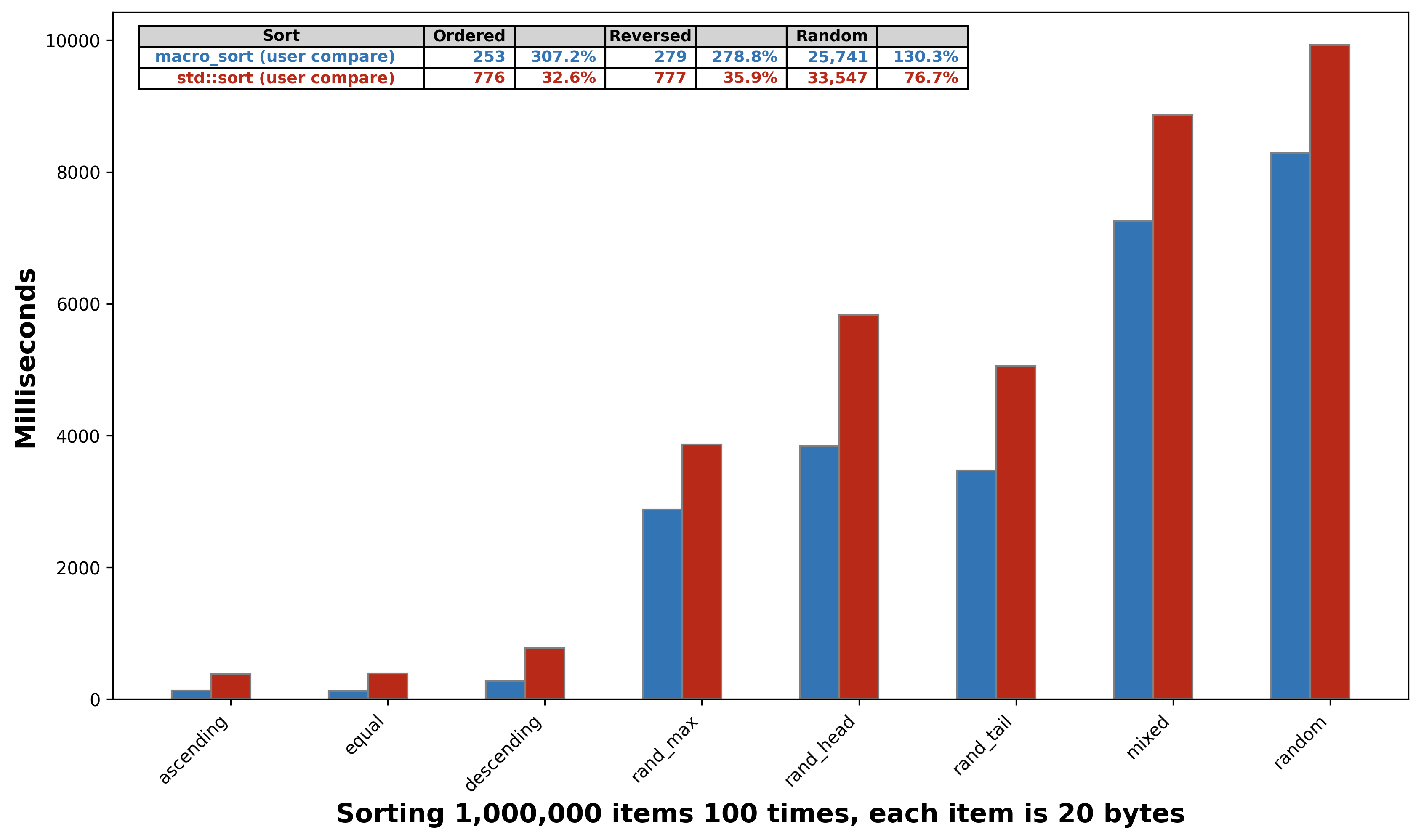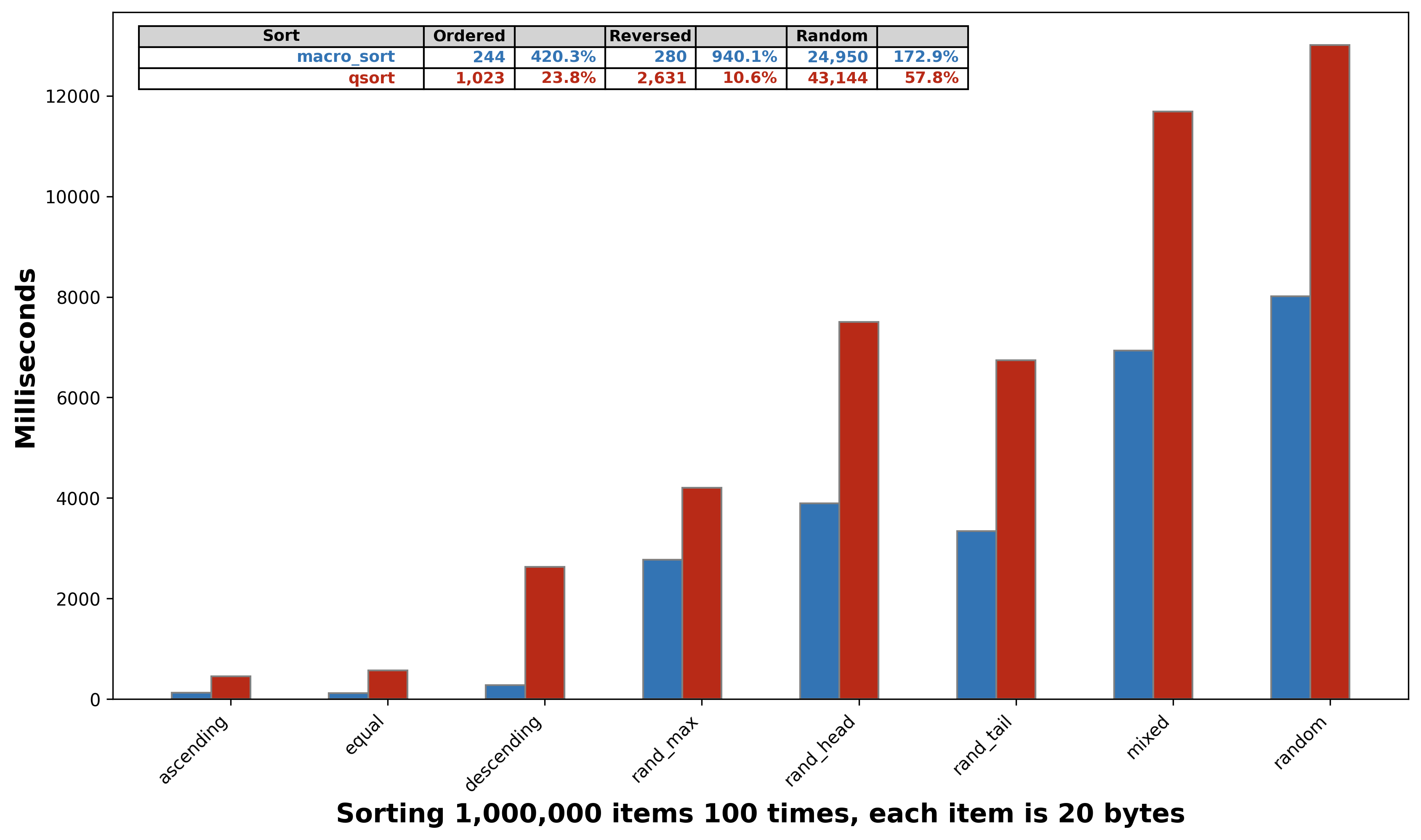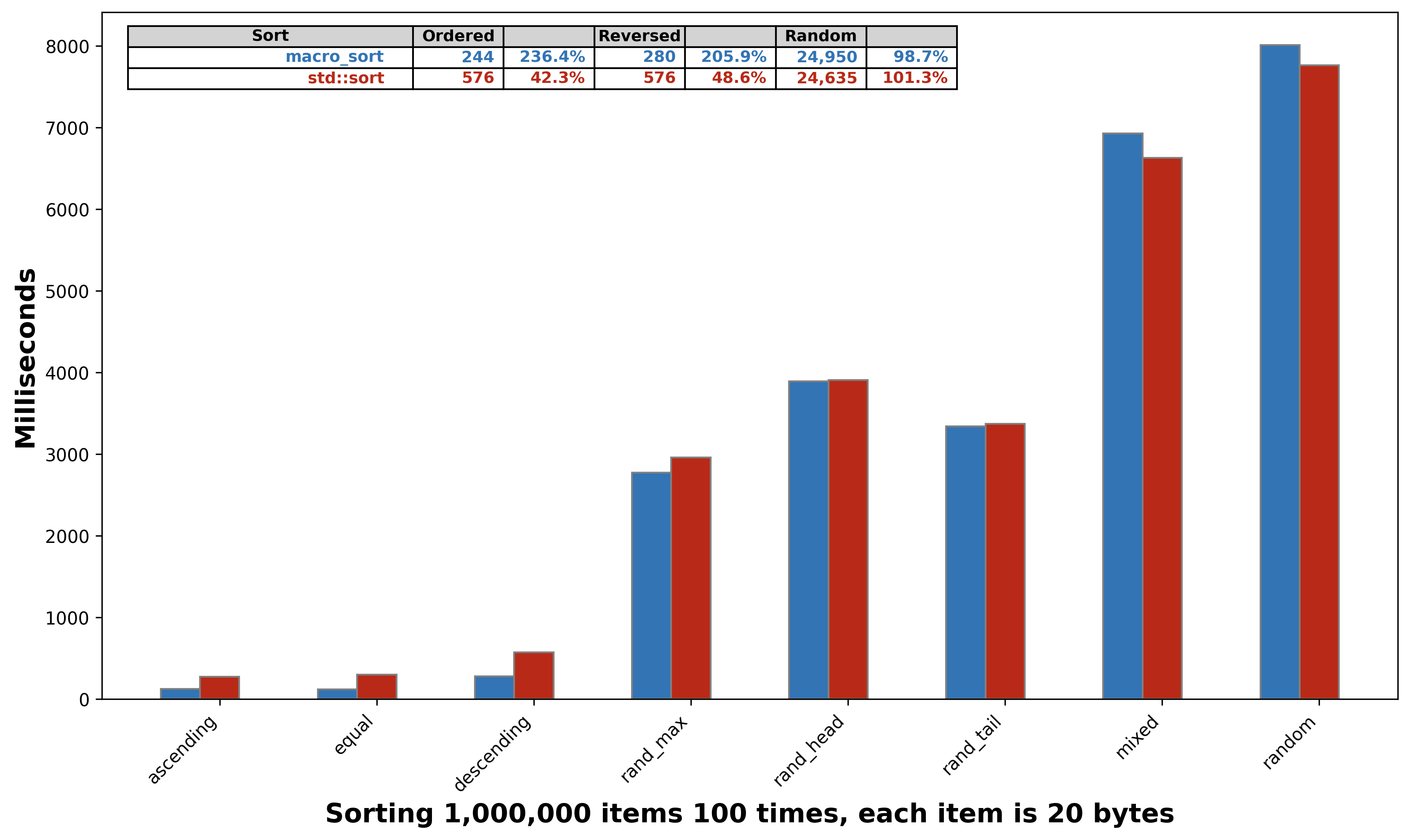The macro library is a C alternative to the standard template library c++ collection (starting with sort, binary search, and the red black tree)
macro_sort (the macro library's version of sort) is introsort with a twist. In the beginning of the sort, the first, last, and mid points are compared to quickly determine that the array sortedness while choosing a pivot.
See improvement to introsort/quicksort for more details on why macro_sort is fast and the math behind it.
macro_sort is an improvement over qsort in a few respects.
- It provides type checking similar to C++'s std::sort
- Types and compare functions can be inlined
- Support exists for a wide variety of compare techniques
- 400% faster for ordered cases
- 900% faster for the reverse case
- 170% faster for random cases
It also performs well when stacked up against std::sort
- 230% faster for ordered cases
- 200% faster for the reverse case
- 98.7% (slightly slower) for random cases
macro_sort performs better when compared against std::sort with a dynamically supplied compare function
- 300% faster for ordered cases
- 270% faster for the reverse case
- 130% faster for random cases
See Performance for more details on the performance of macro_sort
macro_sort vs std::sort with a dynamically supplied compare function

macro_sort.h - a c approach to sorting
macro_bsearch.h - a c approach to searching using various binary search approaches
macro_map.h - a c version of the c++ map (or dictionary)
I welcome suggestions and plan to have more soon!
git clone https://github.com/contactandyc/the-macro-library.git
cd the-macro-libraryMac OS X
python3 -m venv venv
source venv/bin/activate
source .env
pip install -r requirements.txtLinux
python -m venv venv
source venv/bin/activate
source .env
pip install -r requirements.txtWindows
python -m venv venv
source `.\venv\Scripts\activate`
pip install -r requirements.txtTo leave the virtual environment
deactivatemkdir -p build
cd build
cmake ..
makeOptionally build the examples
make examplesOptionally install the library
make installThis library is entirely header based and requires no special linkage.
#include "the-macro-library/macro_sort.h"
bool compare_ints(const int *a, const int *b) {
return *a < *b;
}
macro_sort(sort_ints, int, compare_ints);
int main() {
int arr[] = { 5, 4, 3, 1, 2 };
sort_ints(arr, 5);
... C macros are difficult to debug with most debuggers. The included bin/convert-macros-to-code will convert macros to their base code and preserve readability. Additionally, the convert tool can be used to create functions which have no dependency on this library.
This library has started with introsort and a series of binary search methods. Other algorithms are planned to be added soon.
The sort check at the beginning considers the first and last element of the array and then expects the middle element to be between them. If the middle element is not between them, the introsort continues. Otherwise, two conditions remain. The first is that the first element is less than or equal to the last element. In this case a few additional elements are compared to further check that the array is sorted. If any of those checks fail, the introsort loop is continued. Otherwise, the array is checked from the beginning to the end and if it is entirely sorted, the sort is finished. If the first element is greater than the last element, then the same comparisions continue in reverse. Once the array is determined to be completely reversed, all elements are swapped.
examples/demo/sort_ints.c
#include "the-macro-library/macro_sort.h"
bool compare_ints(const int *a, const int *b) {
return *a < *b;
}
macro_sort(sort_ints, int, compare_ints);
int main() {
int arr[] = { 5, 4, 3, 1, 2 };
sort_ints(arr, sizeof(arr)/sizeof(arr[0]));
for( int i=0; i<sizeof(arr)/sizeof(arr[0]); i++ )
printf(" %d", arr[i] );
printf( "\n");
return 0;
}$ gcc examples/demo/sort_ints.c -o sort_ints -O3
$ ./sort_ints
1 2 3 4 5The default macro_sort function is a less function which takes no arguments. The _macro_sort method allows for custom comparisons. In general, the macro library's approach is to define a customizable underscore prefixed macro and a default macro without the underscores with a common value.
The macro_cmp.h file defines a series of comparison_style(s) which are listed below. If a new style is added to this file, it should allow for the other algorithms to take advantage of it without change!
| Suffix | Comparison Type |
|---|---|
| cmp_no_arg | int compare(const type *a, const type *b); |
| cmp_arg | int compare(const type *a, const type *b, void *arg); |
| arg_cmp | int compare(void *arg, const type *a, const type *b); |
| less_no_arg | bool less(const type *a, const type *b); |
| less_arg | bool less(const type *a, const type *b, void *arg); |
| arg_less | bool less(void *arg, const type *a, const type *b); |
| less | no comparison, expects *(a) < *(b) to function |
| cmp | no comparison, expects *(a) < *(b), *(a) <= *(b), *(a) == *(b) to function |
To make the sort function static or static inline, add it in the line before the macro_sort call.
static
macro_sort(sort_ints, int, compare_int);OR
static inline
macro_sort(sort_ints, int, compare_int);macro_sort has a macro_sort_compare counterpart which defines a sort function that allows for user specified compare functions. This xxx_compare function does not require a compare method to be passed to it.
macro_sort_compare(sort_ints, int);
bool compare_ints(const int *a, const int *b) {
return *a < *b;
}For each macro, there is a corresponding _h macro, (macro_sort => macro_sort_h).
some_header.h
macro_sort_compare_h(sort_ints, int);For headers, it is important to add the semicolon. This produces ...
void sort_ints(int *base, size_t n,
bool (*cmp)(const int *a, const int *b));Use static or other modifiers on the line before if needed.
static inline
macro_sort_compare_h(sort_ints, int);produces
static inline
void sort_ints(int *base, size_t n,
bool (*cmp)(const int *a, const int *b));#define is a very useful mechanism in C/C++. However, these statements present challenges during debugging since debuggers won't typically let you step through a macro. This library helps to address this with the bin/convert-macros-to-code script. The tool will read a source file and replace any macro_...() define statements with their underlying code.
Consider examples/demo/sort_ints.c
#include "the-macro-library/macro_sort.h"
bool compare_ints(const int *a, const int *b) {
return *a < *b;
}
macro_sort(sort_ints, int, compare_ints);
int main() {
...$ convert-macros-to-code examples/demo/sort_ints.c | less
...
bool compare_ints(const int *a, const int *b) {
return *a < *b;
}
void sort_ints(int *base,
size_t n) {
int *a, *b, *e;
int tmp;
if(n < 17) {
e = base + n;
a = base + 1;
while (a < e) {
tmp = *a;
b = a;
...Instead of printing to the terminal, the output can be redirected to a file and compiled.
$ convert-macros-to-code examples/demo/sort_ints.c > sort_ints_d.c
$ g++ sort_ints_d.cc -o sort_ints_d -g
$ ./sort_ints_d
1 2 3 4 5Because the macros are expanded, this new program is easy to debug.
#include "the-macro-library/macro_bsearch.h"
static inline
int compare_int(const int *a, const int *b) {
return *a - *b;
}
macro_bsearch(bsearch_ints, int, compare_int)
macro_bsearch_first(bsearch_first_ints, int, compare_int)
macro_bsearch_last(bsearch_last_ints, int, compare_int)
macro_bsearch_floor(bsearch_floor_ints, int, compare_int)
macro_bsearch_ceiling(bsearch_ceiling_ints, int, compare_int)
macro_bsearch_lower_bound(bsearch_lower_bound_ints, int, compare_int)
macro_bsearch_upper_bound(bsearch_upper_bound_ints, int, compare_int)This produces the core binary search function bsearch_ints and the first, last, floor, ceiling, lower_bound, and upper_bound functions.
macro_bsearch_h(bsearch_ints, int, compare_int);produces
int *bsearch_ints(const int *key, const int *base, size_t n);and it can be used like
int arr[] = { 1, 3, 3, 5 };
int key = 3;
int *r = bsearch(&key, arr, n);
if(r) // key is found and points to one of the 3sThere is also a macro_bsearch_kv macro which allows the comparison function to have a different type for the key than that of the array.
An implementation of the red black tree using macros and inlined code.
Documentation coming soon.
See macro_map.h and examples/demo/map_ints.c
Consider the following array
1, 3, 3, 5
Finds any instance of a key or return NULL if none exist.
| key | response | index | reason |
|---|---|---|---|
| 0 | NULL | none | 0 is not in the array |
| 1 | 1 | 0 | 1 is found in the first index |
| 2 | NULL | none | 2 is not in the array |
| 3 | 3 | 1 or 2 | it is valid for either 3 to be returned |
| 4 | NULL | none | 4 is not in the array |
| 5 | 5 | 3 | 5 is found in the last index |
| 6 | NULL | none | 6 is not in the array |
Finds the first instance of a key or return NULL if none exist.
| key | response | index | reason |
|---|---|---|---|
| 0 | NULL | none | 0 is not in the array |
| 1 | 1 | 0 | 1 is found in the first index |
| 2 | NULL | none | 2 is not in the array |
| 3 | 3 | 1 | The 3 in the 2nd slot is the first instance of 3 |
| 4 | NULL | none | 4 is not in the array |
| 5 | 5 | 3 | 5 is found in the last index |
| 6 | NULL | none | 6 is not in the array |
Finds the last instance of a key or return NULL if none exist.
| key | response | index | reason |
|---|---|---|---|
| 0 | NULL | none | 0 is not in the array |
| 1 | 1 | 0 | 1 is found in the first index |
| 2 | NULL | none | 2 is not in the array |
| 3 | 3 | 2 | The 3 in the 3rd slot is the last instance of 3 |
| 4 | NULL | none | 4 is not in the array |
| 5 | 5 | 3 | 5 is found in the last index |
| 6 | NULL | none | 6 is not in the array |
Finds the first instance of a key or the value less than. NULL is returned if the key is less than any item in the array.
| key | response | index | reason |
|---|---|---|---|
| 0 | NULL | none | 0 is less than any value in the array |
| 1 | 1 | 0 | 1 is found, see bsearch_first |
| 2 | 2 | 0 | 2 is not in the array, 1 is less |
| 3 | 3 | 1 | 3 is found, see bsearch_first |
| 4 | 3 | 2 | 4 is not found, the last 3 is less |
| 5 | 5 | 3 | 5 is found, see bsearch_first |
| 6 | 5 | 3 | 6 is not found, the last 5 is less |
Finds the last instance of a key or the value less than. NULL is returned if the key is less than any item in the array.
| key | response | index | reason |
|---|---|---|---|
| 0 | NULL | none | 0 is less than any value in the array |
| 1 | 1 | 0 | 1 is found, see bsearch_last |
| 2 | 2 | 0 | 2 is less than 3 in the 2nd slot, returning 1 |
| 3 | 3 | 2 | 3 is found, see bsearch_last |
| 4 | 3 | 2 | 4 is less than 5 in the 4th slot, returning 3 |
| 5 | 5 | 3 | 5 is found, see bsearch_last |
| 6 | 5 | 3 | 6 is greater than all items, return last one |
Finds the first instance of a key or the value greater. NULL is returned if the key is greater than any item in the array.
| key | response | index | reason |
|---|---|---|---|
| 0 | 1 | 0 | 0 is less than any value in the array, return 1st value |
| 1 | 1 | 0 | 1 is found, see bsearch_first |
| 2 | 3 | 1 | 3 is the greater value than 2 |
| 3 | 3 | 1 | 3 is found, see bsearch_first |
| 4 | 5 | 3 | 5 is the greater value than 4 |
| 5 | 5 | 3 | 5 is found, see bsearch_first |
| 6 | NULL | none | 6 is greater than all items, return NULL |
This is different than the others in that the response is always one greater than the key. It is possible for this to extend beyond the array. The purpose of upper_bound is to be used in conjunction with lower_bound to form a range.
| key | response | index | reason |
|---|---|---|---|
| 0 | 1 | 0 | 0 is less than any value in the array, return 1st value |
| 1 | 3 | 1 | 1 is found, return next value (3) |
| 2 | 3 | 1 | 2 is greater than 1, return next value (3) |
| 3 | 5 | 3 | 3 is found, return next value (5) |
| 4 | 5 | 3 | 4 is greater than 3, return next value (5) |
| 5 | undefined | 4 | 5 is found, return past array |
| 6 | undefined | 4 | 6 is greater than all items, return past array |
See examples/demo/search_ints.c
Contact me at contactandyc@gmail.com

